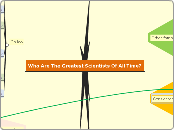によって dina ragab 18年前.
610
Who Are The Greatest Scientists Of All Time?

Who Are The Greatest Scientists Of All Time?
Other questions & important subjects
Is George Bush considered a scientist?
Why great science moved from southern europe to northrn europe
Repercussions of Galileos trial on scientific inquiry in Europe
Are science & religion compatible or destined to clash?
Who controls scientific inquiry?
What latitude should we give scientists?
Why did the Roman Church condemn him?
Didnt find proof why the heliocentric theory was rejected
Challenged the Church and the Pope
Galileo made enemies of key figures
What makes his science different?
What is the science that he did? Why is it science?
Publish results
Test hypothesis
Devise a way to test hypothesis
Hypothesize
Observe
What makes him a great scientist?
Formed basis of modern science of physics
Modified the telescope & observed the sky
What makes him great?
Science greatest Martyr
He changed the way people look & understand the Universe
Who is he?
Court philospher of Florence
First person who used the telescope to observe the sky
Important Italian thinker writer & scholar
4 critical Questions
What makes science different from other ways to understand the Universe?
What is good science- bad science?
What is science?
What is a scientist?
Considered scientists
Fictional Characters
Ghost busters
Dr. Who
Mr. Spock
The Professor
Graham Hacock
Zahi Hawas
John Anthony West
Other famous scientists
Ahmed Zewail
Heisenberg
Niels Bohr
Marie Curie
Thomas Edison
Nikola Tesla
Ibn Al Haytham
Ibn Sina
Most famous scientists
Galileo
Isaac Newton
Albert Einstien
Aristotle

